“Despite the Holy Father’s extensive call to protect our common home, there is still wide-scale deforestation. Water levels are getting lower and lower and people in many parts of the world cannot get good quality water. The quality of soil is also getting lower and lower and the air is getting dirtier,” Archbishop Gervas Mwasikwabhila Nyaisonga said.
Archbishop Nyaisonga added, “If we have to, we must shout for everyone to hear us and to act responsibly. Environmental care is a cross-cutting issue and a responsibility for all of us.”
The Local Ordinary of Tanzania’s Mbeya Archdiocese noted that the Church has an even bigger role to play in the care for the environment.
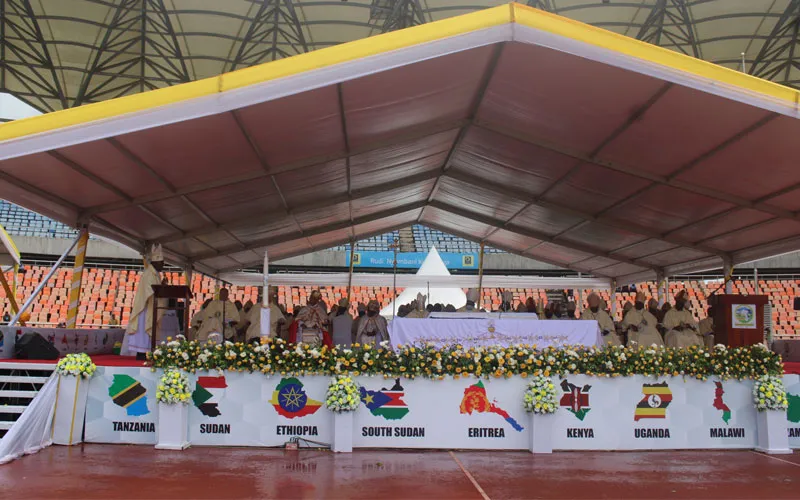 Countries of AMECEA. Credit: ACI Africa
Countries of AMECEA. Credit: ACI Africa
He said, “We have to be on the forefront in educating others, on the forefront in informing others, and in advising them to take action. As a Church, we have to lead by example in the care for our common home.”
(Story continues below)
The Chairman of AMECEA, Bishop Charles Sampa Kasonde noted that every meeting of Catholic Bishops in Eastern Africa becomes an opportunity for the Church in the region to express solidarity.
Bishop Kasonde said that it was the dream of the founding fathers of AMECEA “that all the Bishops in the region journey together in solidarity”.
In his welcome address to delegates of the Plenary Assembly, the Bishop of Solwezi Diocese in Zambia said, “Let us make this 20th Plenary a special ecological moment for the Church in Eastern Africa. It is my prayer that guided by the spirit of that pastoral solidarity, each one of us will play their role to make this gathering a successful convocation.”
“It is also my prayer that this Plenary Assembly within this week becomes a spirit-filled moment of grace and discernment so that by the end of it all, each one of us goes back to our respective Conferences reenergized and motivated, and to continue walking the path of new evangelization as the Holy Father Pope Francis always insists, and guided by the message in the Encyclical Laudato Si’,” the Chairman of AMECEA said.
He urged delegates of the Plenary Assembly that is scheduled to conclude on Sunday, July 17 with Holy Mass to pray for those going through various hardships in the AMECEA region and beyond.
“As we come together as one family of God, let us use this opportunity to meditate and pray for our brothers and sisters who are suffering because of wars, political intolerance and lack of economic freedom,” Bishop Kasonde said.
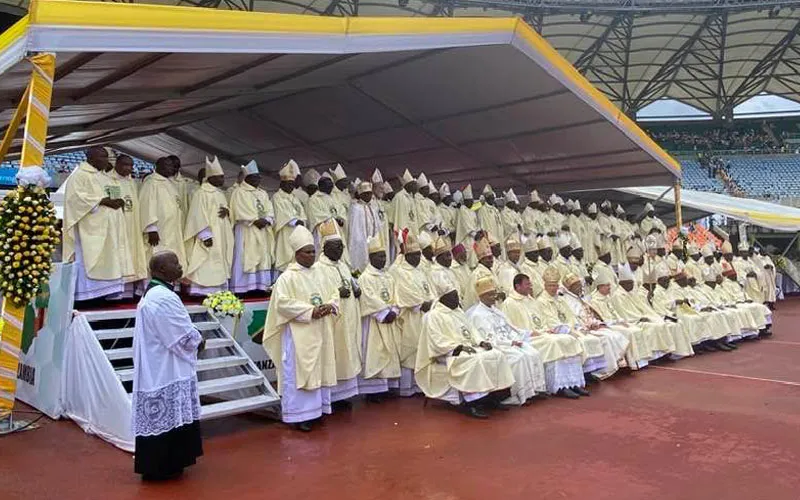 Bishops at Opening Mass. Credit: ACI Africa
Bishops at Opening Mass. Credit: ACI Africa
He added, “Guided by the spirit of solidarity, cooperation and peaceful co-existence, let us remember in a special way, those who are deprived of these fundamental human values in our region and beyond.”
The Zambian Catholic Bishop underlined the urgent need to preserve the environment, saying, “May God inspire us, talk to us and whisper to us on the preservation of our environment and also maintain the green economy.”
In his address during the July 10 event, the Apostolic Nuncio in Kenya and South Sudan lauded what he referred to as the beauty of the Catholic Church in Eastern Africa, which he said is complete with “people from many countries and with different languages.”
Archbishop Hubertus van Megen said, “You heard in the prayers of the faithful how many different languages were used. Languages of the different countries of AMECEA.”
“I think one language was missing- Arabic. We should look into Arabic probably in our next meeting because it is part of AMECEA spoken in northern Sudan,” the Nairobi-based Nuncio who previously represented the Holy Father in Sudan and Eritrea added.
Agnes Aineah is a Kenyan journalist with a background in digital and newspaper reporting. She holds a Master of Arts in Digital Journalism from the Aga Khan University, Graduate School of Media and Communications and a Bachelor's Degree in Linguistics, Media and Communications from Kenya's Moi University. Agnes currently serves as a journalist for ACI Africa.
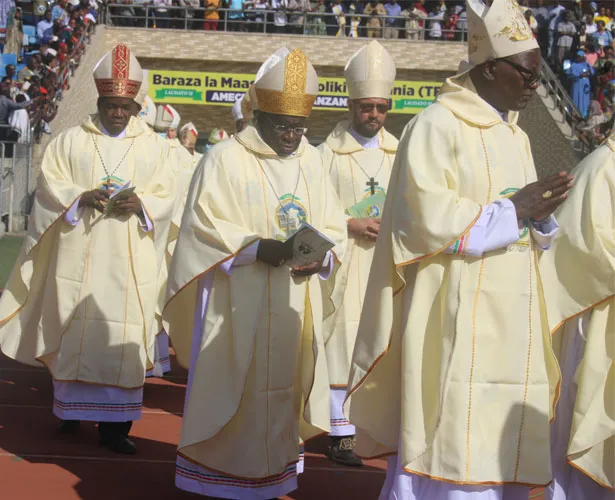 Section of AMECEA Bishops. Credit: ACI Africa
Section of AMECEA Bishops. Credit: ACI Africa


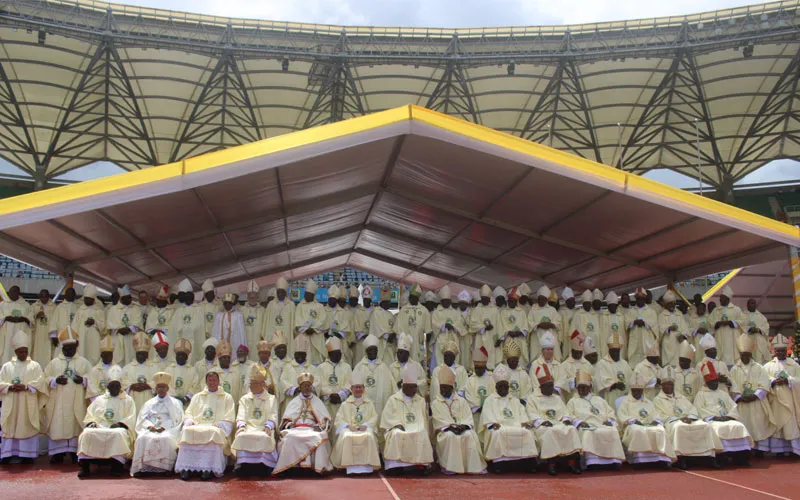
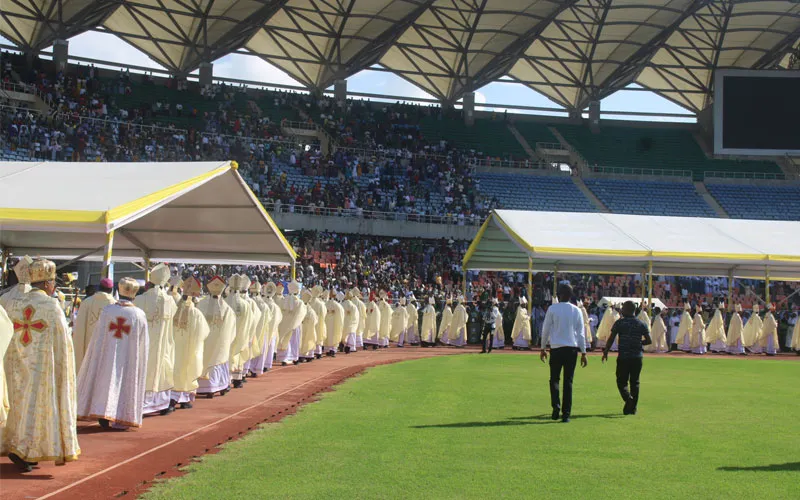 AMECEA Bishops on Mass procession. Credit: ACI Africa
AMECEA Bishops on Mass procession. Credit: ACI Africa
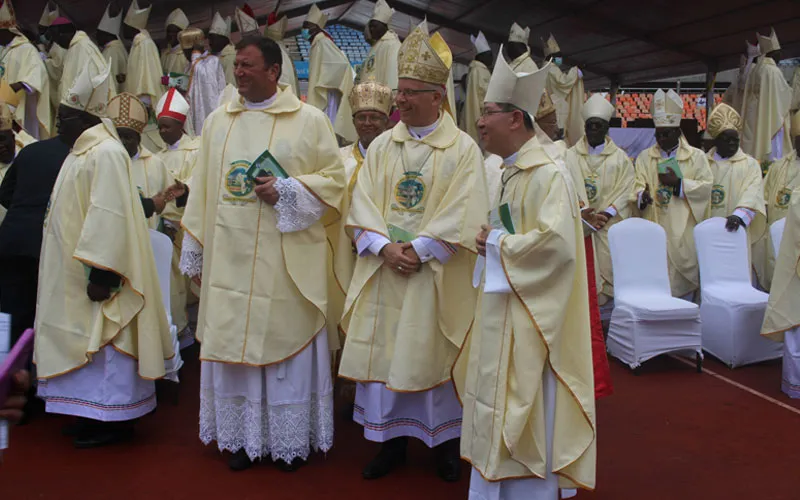 Section of AMECEA Plenary Assembly Delegates. Credit: ACI Africa
Section of AMECEA Plenary Assembly Delegates. Credit: ACI Africa Countries of AMECEA. Credit: ACI Africa
Countries of AMECEA. Credit: ACI Africa Bishops at Opening Mass. Credit: ACI Africa
Bishops at Opening Mass. Credit: ACI Africa


